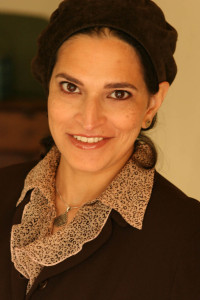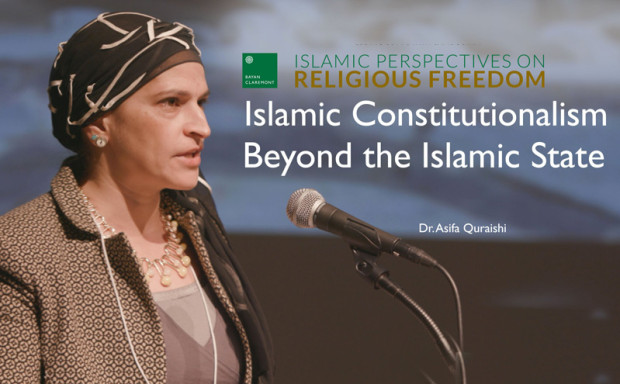 Too often the classic Islamic State is described as a monolithic state in which religion and state are inseparable. Nevertheless, Dr. Asifa Quraishi-Landes, from the Wisconsin University and specialized in comparative Islamic and U.S.constitutional law, refutes this concept and defends the principle of the legal pluralism, preserved for centuries in most of Islamic States around the World, as a way to warrant individual protection and diversity.
Too often the classic Islamic State is described as a monolithic state in which religion and state are inseparable. Nevertheless, Dr. Asifa Quraishi-Landes, from the Wisconsin University and specialized in comparative Islamic and U.S.constitutional law, refutes this concept and defends the principle of the legal pluralism, preserved for centuries in most of Islamic States around the World, as a way to warrant individual protection and diversity.
Source: Islam y constitucionalismo, un diálogo abierto
“Today, there is the presumption that if a government is Islamic, it will do the same thing – it will make the same mistakes of merging religion and the state that happened in Europe, and so many think that the only way to protect individual rights is to “separate church and state” and insist on secular government in Muslim-majority countries. But when I look at Islamic history prior to colonization I don’t see the merging of “church and state” as part of the Islamic government.
More specifically, I don’t see a presumption of legal centralism that existed in Europe (then and now). I don’t see all law coming from a central place and being imposed by the government to be the same for everybody under that system. Actually, what I see both in the legal writing, political writing and in the actual practice of fourteen hundred years of different Muslim states is a presumption that there are actually two types of law, not one. I see this consistent pattern in nearly every place that operated with some sense of Muslim government before colonialism – from Spain to India, through Africa and Arabia, up to Tatar Russia, parts of China, even up to the latest era of the Ottoman Empire. In all these places, there wasn’t legal monism, there was legal pluralism.
This is the idea I was trying to articulate in my chapter in the Max Planck Institute’s book: what I see is a uniquely Islamic constitutional system that does not presume legal centralism where all law come from the same place, but instead starts with the idea that there are two different types of law. One type is the type made by the state/government, (whoever has physical power over the land – whether it is called sovereignty or ruler or caliph or king). The laws made by the physical ruler are one type of law – one that is based on the public good. And then there is another type of law that comes from reading scripture. So for Muslims, this would be the Quran and the Prophet’s example. The kind of law that comes from the interpretation of these scriptures is a very different kind of law than the one the ruler makes for the land.
The traffic law
The example I give in my class is this: if you’re trying to make, for example, a traffic law about which side of the street we should drive on (as you know, in England they drive on a different side of the road than in Spain), then somebody needs to make a rule about that and enforce it to make people safe on the road, so that people don’t drive into each other. But that rule is not going to come from looking at scripture. If you look in the Quran, you are not going to find any answer to the question as to which side of the road we should drive on. It’s just not the sort of question that comes up in the scripture, but it is a question that we need a law about.
The same thing is true of issues like zoning, building codes, the healthcare system, environmental regulations – all these are types of questions that are really about what is best for society, about what is in the general public interest (in Arabic, maslaha ‘amma). These are questions that a) you need to answer for the safety and security and wellbeing of your society, and b) need a general ruler who can enforce them, because if you have an environmental rule about pollution but nobody is enforcing it, then your rule isn’t serving the public good. And that is what the ruler/government in an Islamic state is supposed to do – to make laws – they are called “siyasa” – to make people safe, to build roads and armies, pass zoning laws and public safety laws, and so on. To serve the public good.
But Muslim rulers were not in charge of the other type of law – the law that comes from reading scripture. Muslims read their scripture and see things like, “oh, the Quran says that when I get married I have to have these witnesses, and I get this mahr given to me, or if I die I have to leave my money to these people in my family”. These are rules that come from scripture, so if you believe in the Quran as God’s word, then you want to govern your life by those rules. But there are lots of details that aren’t obvious from just reading the text (and not every Muslim actually could read the text). So, there were Muslim scholars who read and elaborated on these scriptural rules, using legal skills of interpretation.
The difference between ‘Shari’a’ and ‘Fiqh’
And as you know, not everybody reads the same scriptural texts in the same way, so eventually there many schools of Islamic law evolved that are all different interpretations of the same basic scripture.
The kind of law that comes from interpreting scripture is called fiqh. That’s a word which is often confused with shari’a, but I want to be very careful here – this is one of the ways I disagree with Professor Abdullahi An-Naim who you quote in your writing. Professor An-Naim insists in using both words for the same thing and I think this is a big mistake, because fiqh literally means “understanding”, it doesn’t mean “God’s Law.” Faqiha in Arabic means “to understand.” It is very significant to me that when the jurists were interpreting the scriptures, they didn’t use the word shari’a to describe their conclusions; they used the word fiqh. They call themselves fuqaha, which means “people who understand”. This means that they recognized they could be wrong, that they were human beings doing a fallible human job. So they were very careful to say: “this is the best I can do, I think this is the correct interpretation of God’s Law, but it is possible that I’m wrong.”
So, properly speaking, “shari’a” is God’s Law. “Fiqh” is the jurists’ understandings of God’s Law. Over time we ended up having many different interpretations of fiqh, and that’s why have the Hanbali school, the Hanafi school or the Ja’fari school, for example. So fiqh is a very different type of law than siyasa (the law the ruler makes). It is inherently diverse because the very core epistemology of Islamic jurisprudence is that if a human being is doing the reading, the human is fallible, so their conclusions are never certain conclusions, they can only be called probable, at best.
Fiqh scholars were very nervous about imposing their fallible rules on everybody, so there wasn’t a situation where one set of fiqh rules became the one law of the whole land – unlike the legal centralism model of the nation-state, and especially of a state church.
Instead, fiqh rules were applicable to people based on which school they identified with. And the ruler would facilitate this.
So an individual could say: “I want a Hanafi judge to handle my divorce,” but his next door neighbour could be a Maliki and could go to a Maliki judge for her divorce. And their other neighbour might be Jewish and could go to a Jewish rabbi for a halakha-based divorce. It wasn’t a situation where the law that comes from the interpretation of scripture was the same for everybody, it never was.
Al-Andalus as an example of pluralism
And by the way, this is why Muslim societies, Andalusia Spain being a wonderful example, was a place where other religious communities could come and live as a part of the Muslim state, without causing too much difficulty for the overall structure. The Jewish community could live in Andalusia and have Jewish law apply to them, because it was already happening with the Muslim groups: The Ja’fari were having their laws applied to them, the Maliki where having their laws applied to them, the Hanafi theirs, and so on. It didn’t challenge the whole system for a new group to come in and want a different religious law applied to them. It does challenge a nation state system, though, with a legal monism where everybody has the same law for everything.
So, to come back to your question of what is the relationship between the individual and the umma: individuals in Muslim governments before colonialism would have a lot of freedom to follow the version of religious law (fiqh) that they preferred, and the government would facilitate those choices, setting up systems that allowed for them to exist. So if you have a community where there are a lot of Jews, a lot of Shia Muslims, and a lot of Hanafi Muslims, the ruler’s responsibility is to make sure that there is a Rabbi to handle the Jewish community’s legal issues, and that there is a Maliki judge for the Maliki Muslims’ legal needs, and a Hanafi judge for the Hanafi Muslims, and a Ja’fari judge for the Ja’faris, and so on.
As an individual, I go to the community to handle the kind of laws I feel I’m bound by because I think that God is watching me. But for everybody in the wider community (and this is beyond the idea of umma – umma is just the Muslim world-wide community – here, I’m talking about the community of all the people in the land), that is where the siyasa governs. Those laws are made by what the ruler decides is good for everybody. These are always balanced with individual rights, in a very similar way to when the rights of speech are bound by the democratic system. The difference here, I think, is that, there is a lot more legal pluralism at the individual level, and that pluralism doesn’t challenge the overall goals of public rule. So I could still go and say, “I want my divorce adjudicated this way,” even if it is different from the way someone else’s divorce is adjudicated.
More useful and creative
So that answers your question – a long answer, but I believe the key to my answer is this idea of two types of law. It is a characteristic that can be found throughout Islamic history. If you look at those two realms of law – siyasa and fiqh–, they operated as a sort of checking and balancing of each other. They worked together but they were also little bit in challenge of each other, so they kept each other in check, more or less. And I think that it is a much more useful and creative way of protecting individuals, especially when talking about religious law, because it is very dangerous to have one religious law for everybody. The thing I find so amazing is that the Muslim jurists themselves knew that. They didn’t create a system where one religious law applied to everybody. So, Muslims didn’t have the same problems that led to the separation of church and state in the West. Muslims had other problems, sure, but they didn’t have that problem. The fact that Muslim political movements don’t talk about this, to me, shows a lack of creativity.
They are not as constitutionally creative as you are, in fact, with your question. Instead, they just take the presumption of the nation state, they take the presumption that all laws must come from a central place, and then talk about how to make that state Islamic. So, for example, they reason, if we are Muslims, then the laws of the state should all be Muslim laws. And then they call that an Islamic state. But to me, that just takes the nation state and dresses it up in Muslim clothing. It’s not a characteristically Islamic way of doing government. This is due to colonialism, it was then when this sort of took root in Muslim minds because their entire structure of these two types of law was dismantled during colonialism and it was replaced with the central command structure of the nation state model. Now there is this collective amnesia where the Muslims have forgotten what happened before colonialism”.















No Comments